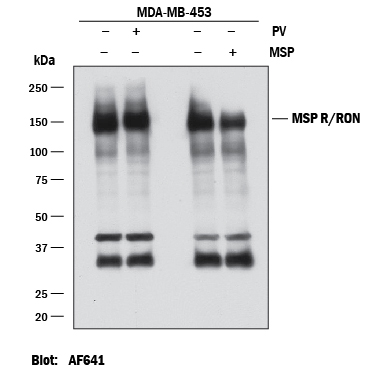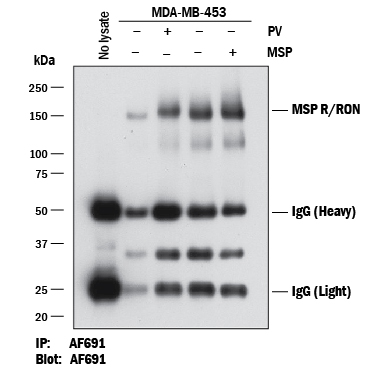Human MSPR/Ron Antibody Summary
Glu25-Ser956
Accession # CAA49634
Applications
Please Note: Optimal dilutions should be determined by each laboratory for each application. General Protocols are available in the Technical Information section on our website.
Scientific Data
 View Larger
View Larger
Detection of Human MSP R/Ron by Western Blot. Western blot shows lysates of MDA-MB-468 human breast cancer cell line untreated (-) or treated (+) with 100 uM Pervanadate (PV) for 10 minutes or 100 ng/mL Recombinant Human MSP/MST1 Protein (Catalog # 352-MS) for 10 minutes. PVDF membrane was probed with 0.2 µg/mL of Goat Anti-Human MSP R/Ron Antigen Affinity-purified Polyclonal Antibody (Catalog # AF691) followed by HRP-conjugated Anti-Goat IgG Secondary Antibody (Catalog # HAF017). A specific band was detected for MSP R/Ron at approximately 150-160 kDa (as indicated). This experiment was conducted under reducing conditions and using Immunoblot Buffer Group 1.
 View Larger
View Larger
Detection of Human MSP R/Ron by Immunoprecipitation. Human MSP R/Ron was immunoprecipitated from 1 mg of lysates of MDA-MB-468 human breast cancer cell line untreated (-) or treated (+) with 100 uM Pervanadate (PV) for 10 minutes or 100 ng/mL Recombinant Human MSP/MST1 Protein (Catalog # 352-MS) for 10 minutes. MSP R/Ron was immunoprecipiated with 1 ug Goat Anti-Human MSP R/Ron Antigen Affinity-purified Polyclonal Antibody (Catalog # AF691). The MSP R/Ron-antibody complexes were absorbed using Protein G Sepharose. Immunoprecipitated MSP R/Ron was detected by Western blot using 0.2 µg/mL of Goat Anti-Human MSP R/Ron Antigen Affinity-purified Polyclonal Antibody (Catalog # AF691).
Reconstitution Calculator
Preparation and Storage
- 12 months from date of receipt, -20 to -70 °C as supplied.
- 1 month, 2 to 8 °C under sterile conditions after reconstitution.
- 6 months, -20 to -70 °C under sterile conditions after reconstitution.
Background: MSPR/Ron
Macrophage stimulating protein receptor (MSP R), encoded by the human Ron and the mouse Stk, is one of a small family of receptor tyrosine kinases (RTKs) that also includes human Met (the receptor for hepatocyte growth factor) and chicken Sea (1, 2). This family of receptors is synthesized as a single-chain precursors that are cleaved into a mature disulfide-linked heterodimers composed of an extracellular alpha chain and a membrane spanning beta chain with intrinsic tyrosine kinase activity. Biologically active ligands (MSP and HGF) for this family of receptors are also disulfide-linked alpha -beta heterodimers. Human MSP R cDNA encodes a 1400 amino acid (aa) residue precursor protein with a 24 aa signal peptide, a 285 aa residue alpha chain (Glu25 - Arg309) and a 1091 aa residue transmembrane beta chain (Gly310 - Thr1400). The extracellular domain of MSP R is comprised of an N-terminal sema domain, a PSI (plexin semaphorins integrins) domain, followed by four immunoglobulin-like folds shared by plexins and transcription factors (3). The soluble sema domain binds MSP and inhibits the MSP R-dependent signaling pathways. MSP receptor is expressed in multiple tissues including specific areas of the central and peripheral nervous systems, epithelial cells along the digestive tract, skin and lung, and in subpopulations of the mononuclear phagocyte lineage (1, 2). Although free MSP alpha or beta chains have been shown to bind MSP R, only the heterodimeric MSP can induce receptor activation and cause biological activity (4, 5). MSP R associates with other transmembrane molecules including integrins, cadherins and other cytokine receptors. Transactivation and signaling crosstalk between MSP R and its associated transmembrane receptors have been demonstrated (6 - 8). Human MSP R shares 72% amino acid sequence identity with mouse MSP R.
- Gaudino, G. et al. (1994) EMBO J. 13:3524.
- Wang, M-H. et al. (1994) Science 266:117.
- Angelonis, D. et al. (2004) J. Biol. Chem. 279:3726.
- Wang, M-H. et al. (1997) J. Biol. Chem. 272:16999.
- Danilkovitch, A. et al. (1999) J. Biol. Chem. 274:29937.
- Danilkovitch-Miagkova, A. et al. (2000) J. Biol. Chem. 275:14783.
- Danilkovitch-Miagkova, A. and A. Leonard (2001) Histol. Histopathol. 16:623.
- Santora, M. et al. (2003) Devel. Cell 2:257.
Product Datasheets
Citations for Human MSPR/Ron Antibody
R&D Systems personnel manually curate a database that contains references using R&D Systems products. The data collected includes not only links to publications in PubMed, but also provides information about sample types, species, and experimental conditions.
3
Citations: Showing 1 - 3
Filter your results:
Filter by:
-
Plasma membrane proteoglycans syndecan-2 and syndecan-4 engage with EGFR and RON kinase to sustain carcinoma cell cycle progression
Authors: DM Beauvais, SE Nelson, KM Adams, NA Stueven, O Jung, AC Rapraeger
The Journal of Biological Chemistry, 2022-05-13;0(0):102029.
Species: Human
Sample Types: Cell Lysates
Applications: Immunoprecipitation, Western Blot -
Functional consequences of the macrophage stimulating protein 689C inflammatory bowel disease risk allele.
Authors: Kauder, Steven E, Santell, Lydia, Mai, Elaine, Wright, Lilyan Y, Luis, Elizabet, N'Diaye, Elsa N, Lutman, Jeff, Ratti, Navneet, Sa, Susan M, Maun, Henry R, Stefanich, Eric, Gonzalez, Lino C, Graham, Robert R, Diehl, Lauri, Faubion, William, Keir, Mary E, Young, Judy, Chaudhuri, Amitabha, Lazarus, Robert A, Egen, Jackson
PLoS ONE, 2013-12-23;8(12):e83958.
Species: Human
Sample Types: Whole Tissue
Applications: IHC-P -
Transactivation of RON receptor tyrosine kinase by interaction with PDGF receptor beta during steady-state growth of human mesangial cells.
Authors: Kobayashi T, Furukawa Y, Kikuchi J, Ito C, Miyata Y, Muto S, Tanaka A, Kusano E
Kidney Int., 2009-02-25;75(11):1173-83.
Species: Human
Sample Types: Cell Lysates
Applications: Western Blot
FAQs
No product specific FAQs exist for this product, however you may
View all Antibody FAQsReviews for Human MSPR/Ron Antibody
There are currently no reviews for this product. Be the first to review Human MSPR/Ron Antibody and earn rewards!
Have you used Human MSPR/Ron Antibody?
Submit a review and receive an Amazon gift card.
$25/€18/£15/$25CAN/¥75 Yuan/¥2500 Yen for a review with an image
$10/€7/£6/$10 CAD/¥70 Yuan/¥1110 Yen for a review without an image

